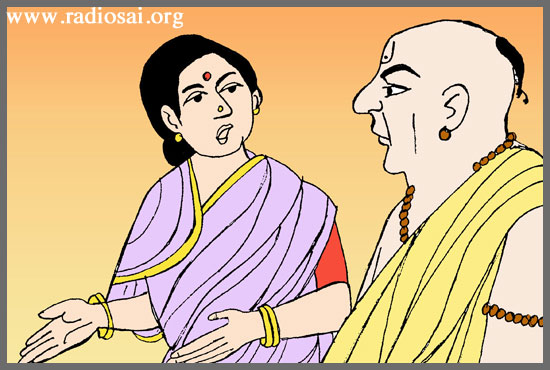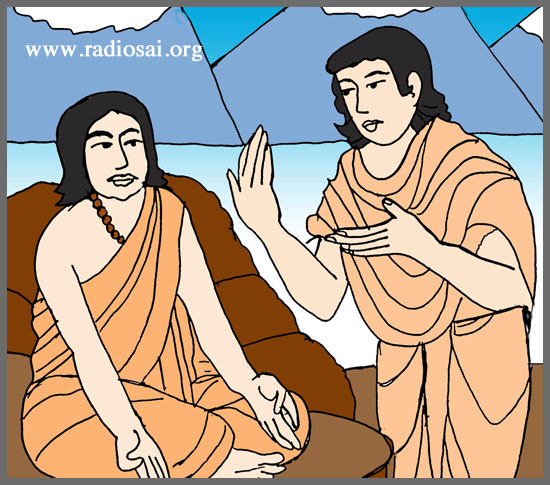Home >>Feature Article |
|
|
| 'Like' us on Facebook | Follow us: |
Posted on : June 12, 2012
STUDY CIRCLE - 7
LIKING SWAMI VERSUS LOVING SWAMI
Part 2
Getting the Essence of His Message
GSS: This is an insightful example, very thought provoking indeed. Ganesh, would you like to add to this?
 |
KMG: We saw how Ananda totally missed the point. In fact, when most of us get into a ritualistic way of life, we forget the spirit behind our actions. It is important to be conscious about where our mind is at the time when we are engaged in action.
This reminds me of a story of a Brahmin who lived right opposite a prostitute’s house. One day, Gautam Buddha was to visit that village. The Brahmin was very confident that Buddha would be very impressed with his piety and respect to rituals and therefore bless his house first.
To his utter dismay, Buddha blessed the prostitute first. The Brahmin’s ego was hurt. He was furious with Gautam Buddha. So when Buddha came to his house, instead of greeting Buddha with pleasantries, he demanded an answer as to why he had to visit the prostitute’s home at all and that too before his home.
Buddha simply smiled and in the most compassionate tone said, “The prostitute is what she is because of some inevitable circumstances of her life. But in spite of your noble lineage and birth, you are always curious and interested about who is coming and going from the prostitute’s house. What a tragedy that your mind is not on God whereas she probably may have more devotion than you.”
Does this not amplify the fact that we epitomise what and where our mind dwells?
SG: Indeed, Ganesh. Your story does tell us that it is important to live by the spirit of the word of the Master. Allow me now to share a story.
 |
It was dawn and two monks were walking by a river that was in a state of deluge. The monks wished to cross over to the other side. Suddenly, they saw a young woman standing on the bank that they were on, calling out for help. She requested the monks to help her cross the river.
One of them immediately carried the woman in his arms, crossed the river, and put her on the other bank. The two monks then continued with the journey towards their destination. It was almost dusk. Throughout the journey, the other monk looked very troubled. Wondering if he was suffering from some internal problem, the monk who had helped the woman asked him if anything was wrong with him.
The other monk replied, “What you did in the morning was not right. How could you, a celibate, touch a young lady and carry her across the river?”
This monk then smiled and said, “My dear brother, she was a person in need and that’s all I knew, I didn’t see it any differently. It has been 12 hours since I dropped her across the bank but it seems to me that you are still carrying her 12 hours hence.”
This story tells us that it is really about living by the spirit of the Master’s words which is much more important than taking the words in their literal sense.
GSS: And as Ganesh said where the mind is, that is where we really are. Talking of stories, I am reminded of a very humorous one that Bhagawan narrates. There was this learned person who used to narrate the story of Lord Rama every day to a spiritual gathering. His discourses used to extend to long hours. The devotees would assemble around him, listen and then move away as and when they wished. But there was one lady who would stay there right till the end of the talk.
 |
The master was thrilled that at least one devotee was touched by his narration and cared to stay till the end. On the final day, he told her, “Mother, I’m really so happy that you have been sitting until the end of my talk. At least my narration has touched one woman among all the other devotees.”
The woman looked at him very puzzled and said, “Master, what are you saying?” He said, “You see, you are the only person waiting until the end of this narration.”
She replied, ‘No, no, the mat on which you are sitting actually belongs to me. I’m just waiting for you to finish, so I can pick up my mat and leave.”
This story is humorous indeed, but is this not what happens most of the time with us?
AD: And, Bhagawan has such a beautiful way of narrating such stories that it goes straight to the heart.
 |
I think Swami has given us a powerful message through the story. Even when we sit opposite Bhagawan, we are so lost in His beauty and grace that we sometimes miss absorbing the messages that He shares with us. I am in fact reminded of yet another very interesting anecdote that Bhagawan used to narrate.
There was a gentleman who gave up everything in life and went to the Himalayas and started a rigorous penance, which included some 16-17 hours of continuous meditation on a particular rock. Several months later, when he came to take his usual position one day, he saw someone else sitting on that rock.
Absolutely shocked, he went up to this person and said, “I think you are sitting in the wrong place, this is my rock and I have been sitting here for days together, in fact months together and doing my penance.”
The other person looked at him and said, “There are so many other rocks here. You are free to go and sit anywhere and meditate.” This yogi went completely berserk.
GSS: This so-called detached person?
AD: Yes, he had given up his family, belongings and city life before heading to the Himalayas. Sadly though, he got hold of a rock and grew attached to it.
I guess in a sense, we all face the same predicament. We lose ourselves into the trees and in the bargain lose sight of the entire forest.
GSS: I think it is becoming quite clear now that in the name of love, we actually look for something with a selfish motive. We are far more interested in our own personal happiness and joy. As Swami always says, ‘If you love somebody, you must actually make that person happy rather than look for your own happiness’.
I have a beautiful anecdote to share that took place recently when Bhagawan’s physical form was not keeping too well. There was this devotee travelling with Bhagawan in the car when he thought it would be good opportunity to speak to Baba and voice his concern about His health.
So he prayed to Bhagawan to cure Himself. In response, Swami instantly said, “Why? I am fine.”
The devotee did not give up and insisted, “No Swami, we cannot see You like this. Please cure Yourself.”
To that, Swami said, “But I am happy!”
 |
 |
 |
 |
 |
 |
 |
 |
Again, the devotee went on, “No Swami, but we are not happy because we don’t feel happy looking at You like this.”
Then Bhagawan smiled and said, “Oh, so for your happiness you want Me to cure Myself.”
The message that He gave was loud and clear - that we are really not concerned about Bhagawan’s happiness but in the name of love we are more concerned about our own state of joy at the sight of Baba.
BP: We are stuck in that phase of ‘what’s in it for me’.
The Meaning of 'Following His Teachings'
GSS: If that is so, where then is the question of love? It cannot be more evident that the words ‘I love Bhagawan’ would require the devotee to follow His teachings in every sense because that is what ultimately makes Swami happy.
This brings us to the next point. When we say ‘following Bhagawan’s teachings’ or ‘loving Bhagawan is following His teachings’ what do we actually mean by that? Let’s look at the first part of that question - following Bhagawan’s teachings. What does that mean? One can actually argue saying, ‘Fine, I meet Him in bhajans, I worship Him all the time; is that not following His teachings?’
Amey, we would love to hear your thoughts on this?
AD: I’m reminded of another beautiful incident related to the paduka pooja that used to be conducted every year. This happened during 1998-99. And you would know that this ceremony would typically have a couple performing prayers to the silver sandals of Bhagawan.
On the conclusion of one such pooja, Swami called a few research scholars for an interview. After deliberating on a lot of things, Swami asked, “So, what is this paduka pooja?”
One of the senior research scholars explained the concept and associated rituals to Swami. To that, Swami said, “No, no, no! That is not paduka pooja. Walking in the steps of the Master is the real paduka pooja which I want you all to do.” Taking a cue from these words, I think loving Swami is about following His footsteps.
 |
GSS: In fact, Amey, we have heard Swami speaking about Aushadham and Pathyam where Aushadham is medicine and Pathyam is the diet. When a patient goes to a doctor, it’s always these two things that he prescribes to make the diseased healthy. While he needs to take the medicine, he must invariably follow a controlled diet.
Bhagawan says the medicine is like loving Swami but the diet is about following His teachings. Then He says, “So if you, the patient, who is suffering from this ailment of the samsara (worldly existence), needs to get healthy you must a) love Bhagawan and b) follow His teaching. In other words, imbibe Aushadham and the Pathyam.”
AD: So well explained.
SG: If I may add to that, in the Ramayana, Lord Rama himself defines what this love truly means for God. We all know the episode where Lord Sri Rama leaves for the forest to serve out his exile and Bharata pleads him to return and take back the kingdom of Ayodhya.
Bharata says, “The king who actually asked you to go away, my dear brother, is no longer there. Why don’t you come and take back the kingdom?”
Lord Sri Rama had a great lesson that he wanted to impart at that moment but He did that through King Janaka. During this whole argument that went on between Rama and Bharata, King Janaka played the role of a judge. When it was time for the verdict to be pronounced, King Janaka said, “When there is a conflict between dharma and prema, where Bharata represents prema (love) and Rama represents dharma or right conduct, it is always love that wins over dharma. In other words, prema wins over dharma.”
Listening to this, all the people of Ayodhya erupted in joy thinking that ‘yes, this is the verdict and Lord Sri Rama will come back because Bharata has won his argument’.
But as usual, in His inimitable way, Rama gives a smile to Janaka, and King Janaka continues, “But prema too has its own dharma. Even love has its own dharma but what is the dharma of love?” He goes on to explain, “The dharma of love is that you need to ask your beloved Lord in what lies His happiness and implicitly follow those words. It is about not imposing on Him what brings joy and happiness to you.”
 |
 |
 |
 |
 |
 |
 |
 |
Hearing this, we all know that Bharata immediately submitted himself to Rama after having realized what true love means. He accepted to rule the kingdom of Ayodhya on behalf of Lord Rama because in that lay the joy and happiness of Lord Rama.
GSS: This communicates a message very clearly, does it not Ganesh?






